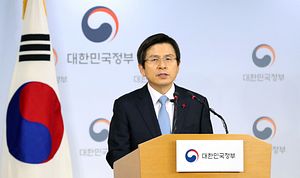South Korean President Moon Jae-in and his liberal-leaning Minjoo Party seemed to be invincible back in June when his public approval rates stood at 79 percent. But the latest polls are showing a different story. His approval rates fell to a low of 49 percent in the first week of September, a significant drop in just a few months.
Decreasing popularity is clearly a headache for Moon and his party. Conversely, this is an opportunity for the country’s conservatives, who have struggled to gain public support amid a series of corruption scandals centered around famous figures, including two former presidents.
Conservatives are gearing up to try for a comeback within the political arena in South Korea, which is currently heavily dominated by their liberal counterparts.
Former Prime Minister of South Korea Hwang Kyo-ahn is taking the lead in this journey. Since the impeachment of former President Park Geun-hye, Hwang has kept a low profile, avoiding the public eye although he is continuously mentioned in most conversations as the ideal figure to consolidate conservatives in the country.
When Hwang made a rare public appearance on September 7 to commemorate the publication of his essay, he said that he was concerned about the country and many had expressed their concerns to him as well.
“Although the situation of the country is tough now, I hope that we can gather up our efforts and work together to overcome the difficulties,” he added.
Hwang kept his remarks vague, without directly pointing fingers at the current administration. But his words were enough to raise a hope among the country’s conservatives that he could soon return to the political stage.
Hwang’s move is not a coincidence, given the result of the latest polls and the questions about who would be the best figure to reshape South Korea’s political landscape in the future.
According to Seoul-based public opinion poll agency R&Search, Hwang topped a recent poll garnering 14.1 percent in the second week of September. He was followed by the current Prime Minister Lee Nak-yeon with 10.8 percent, Governor of South Gyeongsang Province Kim Kyung-soo with 7.2 percent, and Seoul Mayor Park Won-soon with 7 percent.
What is most notable for Hwang and his supporters is that his poll numbers have nearly doubled in less than five months — he was polling at 7.3 percent support in May. Not to mention the fact that three of the top four names — everyone except Hwang — are considered to be liberal politicians, affiliated with President Moon.
When looking at another poll, which narrowed the group of respondents, people’s preference for Hwang is more visible.
According to South Korean politics, society, and economy research firm Realmeter in August, 25.9 percent of respondents with a conservative view said Hwang would be the best candidate for the next presidential election. Hwang was followed by the former Seoul mayor Oh Se-hoon with 9.9 percent and the former leader of the conservative Bareunmirae Party Yoo Seong-min with 9.2 percent.
Critics say Hwang’s association with former President Park is likely to be the biggest hurdle that he would need to overcome on his way.
Hwang served as the justice minister under Park’s administration and he also served as acting president of South Korea following Park’s impeachment in December 2016 until the election of Moon in May 2017.
Public discontent with Park, who was sentenced to 25 years in prison for abuse of power and corruption, is still quite strong in South Korea. After all, the very first thing South Korean politician Hong Jun-pyo did when he became the leader of the Liberty Korea Party was to erase the party’s association with Park.
Since Hwang disappeared from the public eye after Moon was elected, he has not had enough opportunities to do the same for himself.
The rising popularity of a newcomer on the liberal side is also something that cannot be overlooked.
Current Seoul Mayor Park Won-soon has been widely supported by people with liberal views in South Korea and is seen as a promising presidential candidate, but the rise of the current Prime Minister Lee Nak-yeon is also notable.
For starters, the poll by R&Search quoted above shows that Lee has more support than Park.
Realmeter’s poll, which narrowed the respondents according to their political view, also shows that Lee narrowly trailed Park, thought the two are almost neck and neck. According to that poll, 15.8 of respondents with a liberal view said Park would be the best presidential candidate for the next election while 15.3 percent supported Lee.
All these cues seem promising for Hwang, but as always, any poll is a snapshot of a moment in time. The former leader of the conservative Saenuri Party, which has become the Liberty Korea Party, once topped the poll as the most promising presidential candidate, but his rating has fallen very quickly. The same could happen to anyone on the political stage.

































